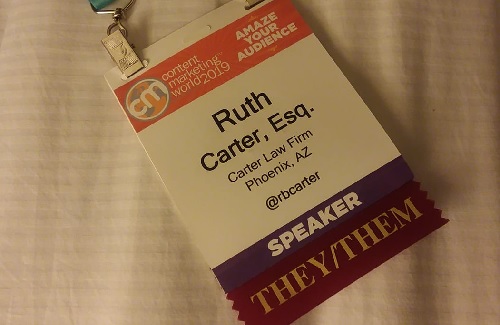A few weeks ago, I received a message from one of my classmates from high school that said her child recently came out to her and her husband as non-binary and said their pronouns are they/them. My friend asked how she can educate herself and what guidance I could offer for dealing with relatives who may be less accepting.
When I responded, I started with, “Oh geez – your life just got a lot more complicated, but in a good way.†I gave her my number and asked her to let her kid know that they have an Oggy Ruth that they can talk to if they need a non-binary grown-up to talk to who “gets it†in ways they’re afraid that others can’t understand. (Oggy is the title I chose since there isn’t a gender-neutral term for aunt/uncle. It rhymes with “doggy.â€)

There’s No One Way to be Non-Binary
If your child was assigned male a birth (AMAB) and they’re actually female or assigned female at birth (AFAB) and they’re actually male, the expected trajectory is more clear and can include a new name, new hairstyle, different clothes, hormones, and gender affirming surgery. If your child is non-binary, it’s best to follow their lead. Invite them to tell you what they need, whether it’s a new name, new hairstyle, or different clothes. They may want some specialty items like a chest binder, stand to pee (STP), or a packer. Ask your child about their thoughts about hormones or hormone blockers. (Hormone blockers didn’t exist when I was a kid, but if I knew I was non-binary back then, I would have wanted them.) They may also want counseling. It’s not easy to navigate a binary-centric world as a non-binary person.
Ask your child what they need from the institutions in their life. They might need gender neutral bathrooms at school. Some schools won’t address a child by their new name unless you legally change it. Your child may want to have their birth certificate and/or driver’s license corrected. Hopefully, you live in a state where you have that option.
In regards to resources, I recommended Free Mom Hugs’ resource page. I love this organization, and this page has a wide variety of resources listed. I love seeing people in the audience at the Pride parade who wear t-shirts that say “Free Mom Hugs†and “Free Dad Hugs.†I always try to stop and hug them.
Dealing with Less Than Accepting Relatives
As the parent, you are your child’s advocate. Ask your kid how they want to tell the relatives, and as long as it isn’t inappropriate, support it.
You may have to have a heart-to-heart with a relative if they are struggling to accept that your child is non-binary. They may have known your kid by a different name and pronouns for over 10 years, and adjusting to the new name and pronouns will be hard. Tell them it’s ok if they make mistakes, as long as they’re trying, and they correct themselves when it happens. Give them a chance to practice by talking about your non-binary child with them. (I have a co-worker who is working on using my correct pronouns. I’m tempted to tell him to talk about me with his family to practice.)
Note: I have a friend who has had a non-binary kid for years. She still occasionally refers to them by the wrong name or pronoun. It’s ok if you or your family doesn’t adapt overnight.
Your relative may have trouble wrapping their head around the idea that a person may not be male or female. That’s ok too. As long as they respect and accept that your child is telling the truth about who they are, I suspect your relative will be fine in the long run. Here’s my favorite video to share with people who are new to learning about what it means to be non-binary. (It’s also quite validating for me.)
Whether your child is a different gender or sexuality than what you originally expected (or both), assume there are going to be inappropriate questions. I tell people that it’s fine to ask me all their potentially inappropriate questions as long as their coming from a place of respect and curiosity. There may be times when it’s best to respond with, “I understand that you’re curious, but that’s a very personal question. My kid will talk about that if and when they decide they want to bring that topic up with you.â€
Don’t be Afraid to Go into Mama/Papa Bear Mode
If you have a non-binary kid, there may be times when you need to go into full-on mama bear or papa bear mode on their behalf. It may be with your child’s school, doctor, a relative, or even the government. Going to bat for your kid validates their experience, even if you don’t get the outcome you want.
When your child tells you about a frustrating experience as a non-binary person in a binary-centric society, acknowledge it, even when you don’t understand why something is a big deal to them. Their feelings are valid, whatever they are. Hold space for your child so they have at least one place where it’s safe for them to be themselves and explore what their gender means to them.

